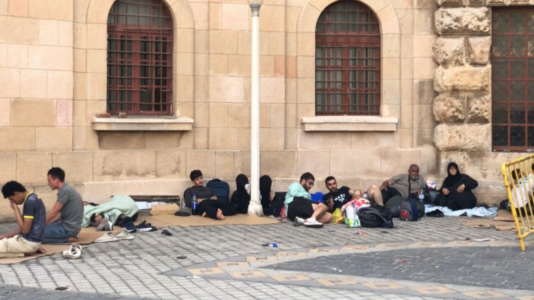Ukraine’s army and general labor market are facing a catastrophic shortage, forcing President Volodymyr Zelensky to somehow get refugees back home, reports Hungarian news portal Mandiner.
Zelensky has continuously tried to either lure or force refugees home, both men of military age as well as women.
A few weeks ago, Polish Foreign Minister Radosław Sikorski, together with his Ukrainian counterpart, encouraged European countries to immediately stop aid to Ukrainian refugees in an attempt to get those who fled the war abroad to return home. He and Zelensky both believe that the EU member states’ current attitude towards asylum harms Ukraine’s defense capability and economic stability.
In other words, Mandiner states, he clearly proposed that the Ukrainian refugees, who left their country because they did not want to die, should be blackmailed back to Ukraine by withdrawing financial aid, and forced into the army.
Eurostat data shows that more than 4.1 million Ukrainians had temporary protection status in EU countries as of this past summer, with some 22 percent being adult men.
However, Zelensky has accused all refugees, both men and women, of not fulfilling “their patriotic duty.” According to a recent survey by Germany’s largest economic think tank, the Ifo Institute for Economic Research, the longer the war lasts, the fewer the refugees will be who consider returning home.
Now, there are reports that Zelensky will force through a lowering of the draft age to 18 from the current 25. Previously, the shortage of Ukrainian men in this particular age group, was reason enough to protect them from the front. Ukraine’s demographic situation is already catastrophic, and a loss of men in this key age bloc could doom the country for generations.
The report pointed out that 25 percent of Ukrainian refugees decided not to return to their country, and 35 percent believed that they would only do so if it was safe. Only 4 percent of those surveyed considered President Zelensky’s urging and are considering the idea that they will return home in a short time, regardless of the current state of the war.
Previously, in the immediate period after leaving Ukraine, only 10 percent had stated that they wanted to permanently settle abroad, and 60 percent stated that they would return home as soon as the security situation allowed.
“Our results show that although many of the Ukrainians who fled still want to return to their country, for the vast majority the prolongation of the war is the deciding factor. The longer the conflict lasts, the more people can imagine their future outside of Ukraine,” says Yvonne Giesing, head of migration research at Ifo.
Unlike Poland, women who fled to Germany reported having a more difficult time, although learning the German language and getting a job helped them a lot, the report found. It has already been well known that without its female population, Ukraine will not be able to rebuild once the war is over. However, Ukrainian women are slowly adapting to their new home countries.
RELATED: 1,400 Ukrainian women in Poland begin training as IT specialists
According to a survey conducted last summer involving 7,000 Ukrainians who fled to Germany, 44 percent of respondents want to stay there for several years or permanently. Three-quarters of them are studying the language intensively in order to integrate as easily as possible and find a well-paying job.
Meanwhile, two-thirds of refugees in Poland, regardless of the outcome of the war, would remain permanently in Poland.
The arrival of Ukrainian refugees in Poland also triggered a wave of new business openings, with these now an integral part of Polish economic growth and job creation, something which, Mandiner points out, does not seem to interest Minister Sikorski nor Prime Minister Tusk.






